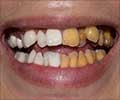The findings of a study conducted at Imperial College London, the University of Bristol in the UK say that several genes affect tooth development in the first year of life.
The findings of a study conducted at Imperial College London, the University of Bristol in the UK and the University of Oulu in Finland say that several genes affect tooth development in the first year of life.
The research, published February 26 in the open-access journal PLoS Genetics, shows that the teeth of babies with certain genetic variants tend to appear later and that these children have a lower number of teeth by age one. Additionally, those children whose teeth develop later are more likely to need orthodontic treatment.The research, led by Professor Marjo-Riitta Jarvelin of the School of Public Health at Imperial College London, scanned the entire genetic code of 6,000 individuals from the Northern Finland Birth Cohort (NFBC1966) and the Avon Longitudinal Study on Parents and Children (ALSPAC), UK, both of which track participants from mother's early pregnancy until adulthood. The researchers identified five genes associated with both the first tooth eruption and the number of teeth at age one. They also found that one of the identified genes was associated with a 35% increased risk of requiring orthodontic treatment by the age of 30 years.
The authors emphasize that tooth development is not an isolated event. Teeth and several other organs have common growth and developmental pathways in early life. Some of the genes identified have been linked in previous studies with the development of the skull, jaws, ears, fingers, toes, and heart.
Abnormal tooth development may lead to dental problems that demand challenging and costly orthodontic treatment. The discovery of genes influencing tooth growth may lead to innovations in the early treatment and prevention of congenital dental and occlusion problems. Professor Marjo-Riitta Jarvelin said: "The discoveries of genetic and environmental determinants of human development will help us to understand the development of many disorders which appear later in life. We hope also that these discoveries will increase knowledge about why foetal growth seems to be such an important factor in the development of many chronic diseases."
Source-Eurekalert
RAS











